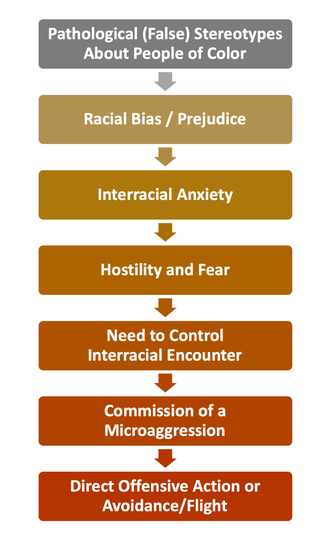Microaggression
Microaggressions Really Are Aggressive
New study finds racial microaggressions are a form of interpersonal aggression.
Posted October 31, 2020 Reviewed by Lybi Ma
The term “microaggression” was originally coined by African American psychiatrist Chester Pierce (1970) over fifty years ago, in response to daily indignities he experienced from White people, including his own students and colleagues. In a paper describing the offensive nature of microaggressions, he writes:
“I notice in a class I teach that after each session a white, not a black, [medical student] will come up to me and tell me how the class should be structured or how the chairs should be placed or how there should be extra meetings outside the classroom, etc. The student is on the initiative and sees as his usual prerogative with a black that he must instruct me and order me about and curb my own inclinations and independence… it is not what the student says in this dialogue, it is how he approaches me, how he talks to me, how he seems to regard me. I was patronized.”
This is an example of a microaggression, where, under the auspices of being helpful, a person of color is subjected to belittling treatment. These acts of subtle prejudice have been defined as microaggressions – brief, everyday exchanges that send denigrating messages to people of color due to racial biases on the part of the offender.

Microaggressions are harmful.
An increasing number of research studies document not only the widespread occurrence of racial microaggressions but also that these experiences are distressing and contribute to a chronically stressful and oppressive environment. For example, studies have found associations between experiencing microaggressions or everyday discrimination, and depression, distress, decreased life satisfaction, alcohol and substance use, anxiety, symptoms of posttraumatic stress disorder, and even suicidal thoughts (Lui & Quezada, 2019). So, from a mental health perspective, microaggressions are indeed a serious concern.
Although research on the impact of microaggressions has gained a good deal of traction, little study has been done on the motivations and characteristics of offenders. In the absence of strong evidence, many have concluded that microaggressions are, for the most part, unintentional or unconscious, reducing the responsibility of offenders and undervaluing victims’ experiences. In a prominent journal, White American psychologist Scott Lilienfeld (2017) called for a change in the name of microaggressions, to “shed the unmerited implication that microaggressions are aggressive in nature and perhaps intent” (p. 161).
Do people know that microaggressions are unacceptable?
There has been some concern that perhaps people are unknowingly committing microaggressions simply because they don’t understand that these actions are wrong. To explore this, my lab conducted a cross-sectional nationwide study with 610 diverse adults from across the United States, and participants were provided with a series of questions surrounding racially-charged scenarios. For White participants, we asked them to rate their likelihood of engaging in the various anti-Black racial microaggressions described. We also asked Black participants how racist they would consider those same microaggressions. There was a strong negative correlation between how racist the items were rated by Black people and how likely White respondents said they were to actually do the microaggression (r=-.488, p=.03). This means that, for the most part, Black and White people alike agree that there something not right about microaggressions – they are not ok to say or do.
How are microaggressions and aggression connected?
Our next step was to determine if microaggressions were best conceptualized as a form of aggression or something else. We measured participants’ affect, hostile thinking and behavior, and overt and covert aggression. We found that the propensity of White people to commit racial microaggressions was strongly positively correlated to their scores on all measures of aggression administered, including the Buss-Perry Aggression Questionnaire (BPAQ) – a gold standard measure of aggressive tendencies (r=.464, p<.001). In other words, people who were more aggressive were more likely to say they would commit microaggressions. Negative affect (a tendency toward negativity) was also correlated to the predisposition to commit microaggressions, but this relationship disappeared when aggressive tendencies were factored into the equation.
Interracial anxiety can cause hostility and avoidance.

In putting this all together, it seems that interpersonal microaggressions are best to be considered a form of aggression and not simply a “cultural faux pas.” Although it has previously been assumed that microaggressions are largely unintentional, the data does not support this. Those who are prone to commit microaggressions are higher in aggressive tendencies which is not explained by simply being a bad mood or being a grouchy person in general. Given that most people recognize that most microaggressions are unacceptable, it makes sense that those who are more temperamentally aggressive would be less likely to suppress the urge to microaggress.
Racial microaggressions may best be conceptualized as deliberate assertion of dominance or hostility, fueled by interracial anxiety that is caused by racial biases. Consider that being around people of color may cause feelings of threat or fear in White people who believe negative things about people of color. Aggression increases feelings of power and temporarily relieves anxiety. This could explain why microaggressions keep happening even after offenders are told that their behaviors cause hurt, frustration, and pain. In the moment, offenders are more focused on controlling the situation than understanding the needs, perspectives, or feelings of the target.
The word “microaggression” is here to stay
In conclusion, when it comes to microaggressions, calls for a change of terminology were premature. What Pierce observed fifty years ago is still true today – microaggressions are a form of aggression and should be recognized as such.
References
Williams, M. T. (in press). Microaggressions are a form of aggression. Behavior Therapy. doi: 10.1016/j.beth.2020.09.001 https://doi.org/10.1016/j.beth.2020.09.001
Pierce, C. (1970). Offensive mechanisms. In F. Barbour (Ed.), In the Black Seventies (pp. 265–282). Porter Sargent.
Lui, P., & Quezada, L. (2019). Associations between microaggression and adjustment outcomes: A meta-analytic and narrative review. Psychological Bulletin, 145, 45-78. http://doi.org/ 10.1037/bul0000172
Lilienfeld, S. (2017). Microaggressions: Strong claims, inadequate evidence. Perspectives on Psychological Science, 12(1), 138–169. Doi: 10.1177/1745691616659391
Williams, M. T. (2020). Managing Microaggressions: Addressing Everyday Racism in Therapeutic Spaces. Oxford University Press. ISBN: 9780190875237




